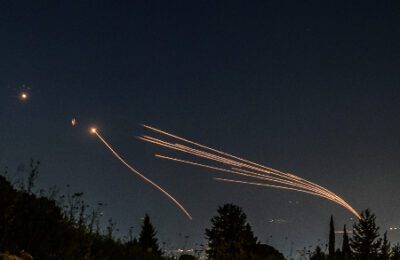The protest movement against the police has put synagogues and other Jewish institutions in a challenging position: They are inclined to stand with the protest movement, but also have built close ties with law enforcement amid rising anti-Semitism, including deadly attacks on Jews in Pittsburgh; Poway, California; and Jersey City, NJ.
“They feel protected and I understand that,” said Tamar Manasseh, an African-American rabbinical student and anti-gun violence activist in Chicago, referring to white Jews. “It’s not their fault that they feel protected. We just don’t.”
Jewish organizations have a history of working closely with law enforcement.
Jewish leaders have been grateful for officers’ quick response to anti-Semitic attacks, and consistently recommend to local synagogues and other institutions that they build close relationships with the police.
“There is prejudice, there is bias [within police forces]. We need to deal with it,” said Abraham Foxman, the former longtime national director of the ADL who established and expanded many of its law enforcement programs.
Foxman said he supports increased police transparency and accountability, “but at the end of the day, the African-American community will need the same protection as we do.”
The ADL is one organization that has tried to straddle the divide.
The group has a long record of working for civil rights and has expressed solidarity with the protests. It has called for aggressive legislation against police brutality. It organized a Shabbat dedicated to anti-racism.
But the ADL appears to be far from backing calls to defund the police, one demand of the protest movement that is gaining traction.
A photo of two police officers graces the cover of the ADL’s guide titled “Protecting Your Jewish Institution,” which recommends engaging with police and other law enforcement dozens of times.
“Get to know local law enforcement and get them to know you before there is a problem,” the guide says.
“Invite local police officers to use your gym, to join you for an oneg Shabbat or just to visit your building and get to know it.”
The principal organization tasked with coordinating protection for Jewish institutions is the Secure Community Network, or SCN, which was created in 2004.
SCN also sees law enforcement as the first address, and one of the main tools for synagogues, schools and community centers to turn to when devising a security plan.
Its current and past CEOs both come from long careers in law enforcement.
SCN often recommends being in touch with the local police department as one of the first steps in any security plan.
In a report issued this year about whether synagogues should hire armed guards — a step SCN did not necessarily recommend, and called “not a security strategy or plan on its own” — the group said the best option is to have an on-duty police officer present.
The group credits law enforcement for preventing further bloodshed in Pittsburgh, Poway and Jersey City.
Its CEO, Michael Masters, is a former Dept. of Homeland Security official in the Chicago area. Masters said he supports efforts to increase police accountability and transparency in ways that make black Americans safer.
He said the Jewish community should take advantage of its relationships with law enforcement to help make that happen while also being more inclusive of Jews of color.
“We have had a perhaps more successful relationship with law enforcement than other communities, and if there are things to learn from that or ways we can leverage that to effectuate meaningful change, that will benefit other communities,” he said.
“It’s also important for us to recognize as a community that we’re not monolithic. We have incredible diversity in the Jewish community.”
But Masters stressed that anti-Semitic attacks remain a present threat and that police are a key partner in preventing it.
“A very real, very deadly and likely more active threat against our community exists,” he said.
“If we recognize all that and accept that we need to ensure the safety and security of the community and the people who walk into our institutions, but there are issues with the organizations that provide some of those services, then we have a responsibility to work with those organizations and institutions . . . to address and correct them.”
The ADL also plays a role in educating police against extremism and prejudice. The group says it’s the largest nongovernmental trainer of law enforcement in the country and has trained 150,000 personnel.
Some of the training is on counterterrorism, but many of the programs focus on how to recognize hate crimes and fight implicit bias.
One program takes officers to the US Holocaust Museum in Washington, DC, to show them how local police during the genocide carried out racist and genocidal policies.
The ADL’s Center on Extremism has provided intelligence on extremists to the FBI that has helped lead to arrests.
Current ADL officials declined to be interviewed for this article.
Rabbi Capers Funnye, an African American, said that his synagogue on Chicago’s South Side is in touch with police but relies principally on a network of close relationships across the neighborhood to create a feeling of security.
Some Jewish activists have joined the call to defund the police. For Jews for Racial and Economic Justice, a New York City group, that means a demand to reduce the $6 billion NYPD budget by at least $1 billion.
Leo Ferguson, a black Jewish organizer with the group, says he personally thinks New York City does need an armed municipal security force, but it should be much smaller than what currently exists.
He hopes synagogues will start building alliances with other vulnerable groups in their neighborhoods to provide mutual allyship and security rather than be under armed guard.

















